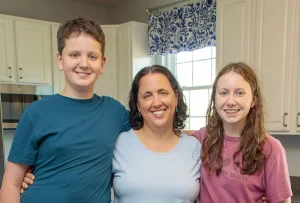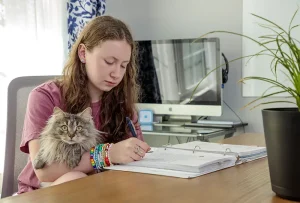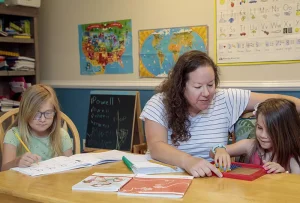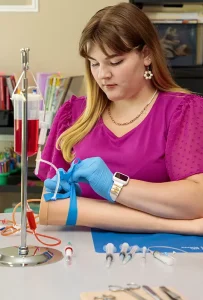by Lois Szymanski, photography by Nikola Tzenov
A New View of Homeschool
Embracing the Shift in Education Norms
Homeschooling has been a popular educational choice for a long time, but in recent years, more families have been educating their children at home. In the past, many families decided to homeschool for religious reasons or because their child had unique medical or emotional needs that the family felt could be better met at home.
However, the availability of technology and the internet, coupled with a pandemic that ushered in a wave of online learning, has led people to consider homeschooling as an option alongside public and private schools.
In 2019, before the pandemic, about 2.5 million students were homeschooled in the United States. Today, this number has surged to nearly 4 million. Carroll County is experiencing the growth trend as well.
Maria Martin, Carroll County Public Schools supervisor of student support, says that during the 2019-2020 school year, 1,207 students in Carroll County were homeschooled. That number jumped to 1,845 in the 2023-2024 school year.
“I think homeschooling during COVID-19 allowed parents to see their kids in a different way, and some found that to be a better fit, especially for immune-compromised kids, introverts or those who work better in a quiet environment and thrive when working on their own,” says Kim Brown, founder of the Hampstead-based Carroll County Homeschool Community Center.
Brown holds a master’s degree in education and homeschooled her children. One of several homeschool groups and organizations in Carroll County, the Carroll County Homeschool Community Center offers a “secular and progressive homeschooling community.”
According to the organization’s website, the center works with various age groups and offers classes, field trips, community events, parent support, park meetups, clubs and other activities.
Janet Schreck of Westminster, once a reluctant homeschooler, says she is now confident that homeschooling is the best option for her son, Chris.
“Continuing in a traditional school system would have been incredibly detrimental to his learning and mental health,” she says. “We elected to homeschool after it became evident that neither the public nor private schools in the area could successfully navigate his learning differences and anxiety.”
In school, Chris faced bullying and a system that couldn’t adjust to his learning needs. He began his homeschooling in fifth grade, during the spring of 2019.
The Schreck family enrolled Chris in a few Carroll County Homeschool Community Center classes. Schreck says that Chris could do the online curriculum part from home with his dad’s guidance and structure his own day. She said he was given the freedom to pick which subjects he did first and what hours he worked on them, but no matter how he arranged it, he had to put the time in.
Today, Chris is more self-aware and a much different young adult because of his homeschooling experience, she says. “I think homeschooling saved him, not only in terms of education but also with his mental health.”
Brown says that a full day in public school is hard for kids who need to learn at their own pace. At home, they target subjects they like best.
“I made sure we [the Homeschool Community Center] had my favorite things from public school, like a history fair, an art fair, a cake fair, a science fair, a business fair and a geography fair,” Brown says. “We focus on things that help kids with public speaking because that can grow confidence. We do robotics, have a model engineering club and do lots of field trips.”
Homeschooling also allows students to spend more time on subjects they are interested in and enables parents to participate in the learning process.
“My daughter is thinking about being an architect. For her senior year, she can take a class online with other people interested in becoming an architect. They’ll work with a trained architect,” Brown says. “Next year, she’s doing the history of Africa and Asia studies, which would not have been a choice in our local public school.”
Kerry Powell of Finksburg, who homeschools 9-year-old Kaylee and 6-year-old Taylor, recommends that anyone contemplating homeschooling should seek a homeschool community. She started to homeschool Kaylee when she was entering kindergarten in 2019.
“Soon after, [she] started having medical problems that would have been hard to manage in a public school setting,” Powell says. “We’re able to manage doctor appointments, work and schoolwork around a busy schedule in a place where my daughter is comfortable.”
Manchester resident Annemarie Schmitt homeschools her 13-year-old, Aliviana, while 10-year-old Emmalyn is on home and hospital leave. When COVID-19 hit and schools moved to distance learning, she says she watched Aliviana struggle with virtual lessons.
“My older daughter has some ADD and some vision issues that made reading difficult,” she says. “The school was resistant to help her since she was on grade level, but she hadn’t improved in reading in a year.”
As a former teacher, Schmitt says she knew her daughter could learn the same material in much less time being taught one-on-one. She believes that homeschooling allows her to teach using learning styles that cater to Aliviana’s needs.
“I can’t say for sure if we would have chosen homeschooling without COVID,” Schmitt says. “We have become very close, have a much better relationship, and she’s doing better academically. She wants to go into the medical field, so our curriculum focuses on anatomy and physiology to support her future goals.”
Just as Kiki Aldrich’s daughter was about to enter kindergarten, COVID hit. She and her husband did a deep dive into homeschooling and decided to give it a try.
“Everything can be tailor-made to match your child/children’s learning styles,” the Westminster resident says. “My daughter learns best through visual lessons and practical applications. We make it fun and in line with her interests. We are also shaping her ethical and moral boundaries. It’s priceless, and we wouldn’t trade it for anything.”
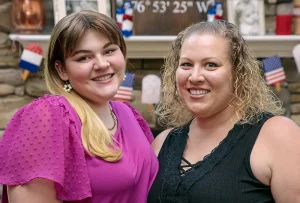
“We have become very close, have a much better relationship, and she’s doing better academically.”
– ANNEMARIE SCHMITT
In New Windsor, Tiffany Hicks mixes it up. Eleven-year-old Michael is in private school, while 17-year-old Mackenzie graduated from homeschool last spring.
“We decided to homeschool, un-school and school all at the same time,” she says.
“I did not feel like public school was the right choice for us. For the past 17 years, we’ve utilized local groups, co-ops, private school groups and homeschool umbrellas. We joined the Peach Tree Homeschool Academy for all our homeschool needs this year.”
Like other homeschool families, Hicks says the flexibility makes homeschooling appealing.

“Everything can be tailor-made to match your child/children’s learning styles. My daughter learns best through visual lessons and practical applications.” – KIKI ALDRICH
“It’s the freedom to choose how you want to learn, in person or online, and when you want to start, at 6 a.m. or 6 p.m. And it’s the flexibility to travel,” she says.
But there are downsides. Schreck says it’s a challenge for her husband to handle the roles of parent, disciplinarian and teacher all at once. He provides most of the home instruction, and it can be easy to burn out. Aldrich adds that it’s essential to have a support system and to be able to take days off to recenter. Others recommend joining a homeschool group or community.
Stress is inevitable, but Schreck advises parents to stay the course. “Find what works for you,” she says. “Keep trying, because the benefits will outweigh any difficulties you have in the beginning, and ask for help. The homeschooling community is extremely supportive. We all want to help each other succeed.”
Homeschooling FAQs
How does a family begin homeschooling?
A parent or guardian who chooses to provide a home instruction program for their child must complete the local school system’s Home School/Home Instruction Notification Form indicating consent to the home instruction regulation requirements. The parent must submit this form 15 days before the program begins.
Does the local school system or the Maryland State Department of Education provide a required curriculum to use for home instruction?
A parent or guardian who chooses to provide a home instruction program is responsible for selecting the curriculum and/or instructional materials to be used. The home instruction regulation outlines certain aspects of the program that must be present but allows the parent or guardian a certain amount of flexibility to create a program that meets the child’s needs.
Are any subject areas mandatory to a home instruction program?
The home instruction program must include instruction in English, mathematics, science, social studies, art, music, health and physical education.
Does a home instruction program have to follow the regular school year?
The home instruction regulation only requires that the program take place regularly during the school year and be of sufficient duration to implement the instruction program. Some families mirror the regular school year but adjust the weekly schedule of their home instruction program to accommodate certain religious holidays or the work schedule of the parent or guardian. Other families choose to provide home instruction year-round and take more frequent but shorter vacations during the year.
What may a school system reviewer request from a portfolio of materials?
The reviewer may ask to see materials that demonstrate the parent or guardian provides regular, thorough instruction during the school year in the required subject areas. Some items that the parent or guardian may provide include instructional resources, such as reading materials and examples of the child’s writing, worksheets, workbooks, creative materials and tests. Portfolio reviews occur at the end of each semester.
Learn more about homeschooling requirements at Carroll County Public Schools (CarrollK12.org) and the Maryland State Department of Education (MarylandPublicSchools.org).


